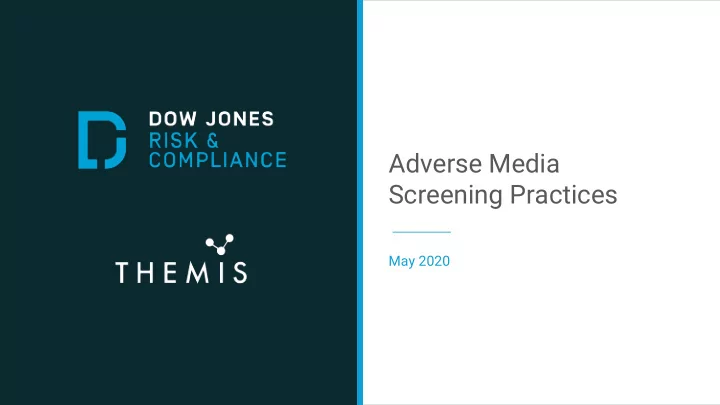

Adverse Media Screening Practices May 2020
Speakers David Balson Gavin Lockhart Mirams Henry Williams Director of Intelligence MD Think Tank & Founder Head of Investigations Ripjar Themis Themis Kenneth Gazzaway Director, EMEA Regional Kevin Wolf Head of Anti-Bribery & Corruption Compliance Product Strategy Director MUFG Bank Dow Jones Risk & Compliance
What is Adverse Media? Adverse media screening (AMS)—also known as media monitoring As part of our drive to help our customers, Dow or negative news screening — is an important part of customer due Jones: diligence (CDD). ● Completed a global Adverse Media study AMS is the process in which a customer, or prospective customer, conducted in partnership with Themis in is compared (or "screened") against negative information and data September 2019 sources ● As part of this, we conducted an online AMS allows firms to identify and prevent potential problems before survey as well as in depth interviews with key they arise and also helps organizations avoid reputational damage. adverse media SMEs and practitioners - a mixture of frontline staff, C-suite leaders and board members.
Poll Question What are the biggest challenges you face when conducting AMS? 1. Quality of news sources 2. Screening in different languages / jurisdictions 3. Volume of alerts 4. False positives 5. Setting a company wide risk threshold
Regulators suggest that adverse media screening either “must” or “should” be completed, and still issue significant fines when firms do not follow this guidance. Financial Conduct Authority (FCA)
FCA FINE “There was no evidence that money laundering risks or adverse £896,100 on media related to its customers were considered by senior Canara Bank UK management of Canara during the onboarding process or 2018 subsequently.” FCA FINE “FCA highlighted that the UAE branches were required—but £102,163,200 on failed—to repeat due diligence in response to a number of trigger Standard events, including when negative press warranted it. As a result of Chartered Bank this and other failings.” 2019
Adverse Media Best Practice Guide Help organizations identify special-interest and reputationally exposed persons and entities according to carefully considered categories of risk, enhancing protections against financial crime. Six Step Recommended Framework: 1. Set your risk appetite clearly & perform a risk assessments 2. Screen at the right time 3. Build checks based on credible, current news sources 4. Create and maintain an audit trail 5. Use (the right) technology to reduce burdens 6. Establish a strong anti-financial crime culture
Poll Question Which of these steps would you like to understand more? 1. Set your risk appetite clearly & perform risk assessments 2. Screen at the right time 3. Build checks based on credible, current news sources 4. Create and maintain an audit trail 5. Use (the right) technology to reduce burdens 6. Establish a strong anti-financial crime culture
Case Studies Why is this important? Two cases of how adverse media screening could have helped.
Speakers David Balson Gavin Lockhart Mirams Henry Williams Director of Intelligence MD Think Tank & Founder Head of Investigations Ripjar Themis Themis Kenneth Gazzaway Director, EMEA Regional Kevin Wolf Head of Anti-Bribery & Corruption Compliance Product Strategy Director MUFG Bank Dow Jones Risk & Compliance
Thank You
Recommend
More recommend